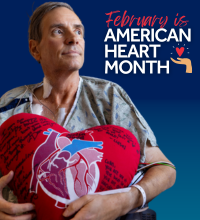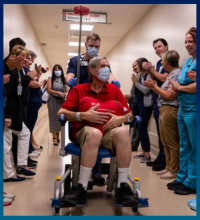Heart to heart: Banner – University Medical Center celebrates 100 heart transplants
02/01/2024
February is American Heart Month
Banner – University Medical Center Phoenix’s Advanced Heart Failure Program recently completed its 100th successful heart transplant since the program started three years ago. It is the only hospital in Arizona with a comprehensive heart failure center and has become one of the busiest artificial heart development centers in the world.
53-year-old Colin Judd of Avondale was diagnosed with congestive heart failure and was told his heart was functioning at about 15%.
The first heart transplant was completed in February 2020 and since then, the program has continued to grow, outperforming the national average. Current post-transplant survival rates after one year are 95%. A vital part of the transplant program’s success is the ability to utilize short- and long-term mechanical circulatory support devices to bridge the patient to transplant. This is the only program in the state implanting both left ventricular assist devices and total artificial hearts and has the highest survival rate in the world for patients receiving an artificial heart in 2022 and 2023.
Additionally, in collaboration with Banner – University Medical Center Phoenix’s Kidney Transplant Program, 12 dual organ heart-kidney transplants have been performed in this time with outstanding outcomes.
Bivacor, an FDA approved artificial heart, and BUMCP is one of only 3 sites in the world to be approved to use it
“We are incredibly proud to celebrate this important milestone for our program, which is a leading destination for patients suffering from heart failure not only here in Arizona, but in the southwestern region and around the entire country as well,” said Dr. Francisco Arabia, physician executive for the Advanced Heart Failure Program.
Colin Judd of Avondale first started noticing symptoms in May. The 53-year-old was diagnosed with congestive heart failure and told his heart was functioning at about 15%. His doctor told him he likely would have died if he had waited any longer to come to the hospital.
“For me, it’s a new lease on life. It’s a chance to start all over again,” Colin Judd said.
A little more than a month later, Judd received a phone call letting him know that there was a donor heart ready for him. The following evening, he underwent a successful heart transplant surgery at Banner – University Medical Center Phoenix. He was then discharged from the hospital a couple of weeks later — leaving with a heart pillow in his hands and a new, healthy heart in his chest.
“For me, it’s a new lease on life. It’s a chance to start all over again,” Judd said. “And I hope that one day I’ll be able to meet that family and tell them thank you, and let them know that their loved one is still living on right here.”
“These are often some of our most complex patients, and we strive to give them all another chance at life by utilizing the best therapies, including transplantation and artificial heart,” added Dr. Radha Gopalan, medical director for the Advanced Heart Failure Program.
Heart failure, which occurs when the heart can’t pump enough blood and oxygen to support other organs in the body, affects about 6.2 million people in the United States. Common symptoms can include shortness of breath with activity or when lying down, fatigue, swelling in the legs or feet, a rapid heartbeat, and coughing or wheezing. By implanting a total artificial heart as a bridge to transplant for a heart from an organ donor, patients can often go back to living a normal lifestyle after facing a dire diagnosis.
Judd emphasized the importance of recognizing the signs and symptoms of heart failure in addition to showing up for routine checkups.
“When I checked in initially, I didn’t even know there was anything wrong with my heart — I didn’t know the symptoms,” he said. “If I can get one person to go and get checked and it helps them get care soon enough, then I’ll feel like this was all worth something.”
Banner’s Cardiovascular program is one of several key areas of care that is flourishing thanks to philanthropic investment from generous donors—and we have even more ambitious plans to bring the very best heart care to our patients in Arizona and the south and mountain west. Visit here to explore ways you can make a positive impact on the heart health of our entire community.
Check out the 12 News feature below:

